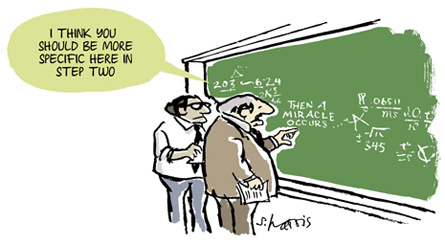Foundations of Music Education  Lecture: The Philosophy of Music Education |
|
Syllabus Course Outline | 
Philosophy
'The History of Western Philosophy in Under 5 Minutes' (YouTube) Well, what did you think? There are lots of ways to explain life's difficult questions. Three come to mind:  | answers based upon faith (a belief) These do not have to be based upon religion. We have lots of beliefs that we take for granted, that are not based upon empirical evidence and that have not been subjected to systematic inquiry.
A belief is something that is accepted without proof. | | | | answers based upon empirical evidence; direct observation and measurement (a finding) You do not have to spend your time in a lab to generate findings. We observe and measure things all the time.
A finding is a fact that can be proven and replicated. |  |  | answers based upon reasoning from systematic inquiry (a philosophy) Philosophies are also common. We look for rational explanations and patterns.
A philosophy is the result of a study of things in order to reach a
"truth." It is the practical application of belief, a system that is
the result of previous experiences and reflections - it is the end
of a process (but still not a fact). "Philosophy searches for consistent relationships of truth, reality, and value in a general inclusive sense" (Schwadron, 1984). | | | | The trouble starts when we try to combine these processes 
| | The trick is to be able to recognize the difference between beliefs, finding, and philosophies. Here's an example: If you are making a bookcase Belief: "I can 'eyeball' this length because I have faith in my ability to judge the size I need." Finding: "I have measured this carefully and have cut the board to my exact specification." Philosophy: "Measure twice; cut once." Are there other ways to explain life's questions?
 |
OK, now back to music education!! What does the philosopher really know about the practical matters of teaching? 
We all have philosophies that we live by. They are inextricably woven into who we are, and therefore what and how we teach.
We transmit to our students (whether we know it or not!) a set of beliefs about music (and other things!) value judgments about music and about the cultures that produce music attitudes about music and its function in our society
 | For example, there was an interesting study on students' beliefs regarding why some succeed and some fail in music (Asmus, 1986). This is important to know because their beliefs about what causes success or failure in musical endeavors will influence how they approach the task next time, or if they even try. Here's what they found out:
 | The students who believe that if they try hard, they will be able to improve are more likely to practice and more likely to improve |
 | The students who believe that musical success requires innate ability ("talent") are less likely to practice, and less likely to improve |  | The greatest influence on this belief was teacher influence |  | The older the student, the more likely they were to believe in the innate ability theory |
The younger students were the most positive about their own abilities!! So, no pressure,  but the success of your students may depend upon your beliefs and your philosophies with regards to music education. but the success of your students may depend upon your beliefs and your philosophies with regards to music education. Here's a link to the study if you'd like to read it for yourself. | | | |
Now read this article linked below: "Considering Beliefs in Learning to Teach Music" 
Your text describes a philosophy as "general notions about the environment and how it operates" (Labuta & Smith, 1997).
The word, philosophy literally means "love of wisdom."
Philosophy has also been described as a guide for living or a way of
thinking about the world.
Here are some of the difficult questions that philosophy seeks to answer about music:
What is music?
What purpose(s) does it serve?
How should music be judged?
Is music necessary?
What does music mean?
How does music affect feeling and emotion?
What is the value of music?
Why must we defend music?
  At this point, read Chapter 2 in your textbook: "Philosophies of Music Education" At this point, read Chapter 2 in your textbook: "Philosophies of Music Education"
Here is a great link to compare the Aesthetic Philosophy and the Praxial Philosophy of music education. |
| Works Cited Asmus, E. P., Jr. (1986). Student
beliefs about the causes of success and failure in music: A study of
achievement motivation. Journal of Research in Music Education, 34(4), 262-278. Labuta, Joseph A. and Deborah A. Smith.
(1997). Music education: Historical contexts and perspectives. Saddle River, N.J.: Prentice Hall. Schwadron,
Abraham A. (1984). Aesthetics: Dimensions for music education: Aperture. Thompson, L. K. (2007). Considering
beliefs in learning to teach music. Music Educators Journal, 93(3), 30-35.
|
P.S. Prior to
completing the discussion assignment for this week, consider this:
|
I n
previous groups who have discussed this, I have been very inspired by
their beliefs, findings, and philosophies. Their students are very
fortunate to have such dedicated teachers. I also appreciate positive
support for each other and encouragement as they participated in the
discussion forum. Having said that, of course, I will throw a fly
in the ointment (so to speak ;-). As you discuss beliefs, findings, and
philosophies, this week, in addition to being a positive influence on
each other (telling each other that you agree with their thoughts or
choices), part of the learning process is the honing of critical
thinking skills. I don't mean 'critical' in the sense that we usually
think of. I mean it in the sense used as a conductor would. For
example, when you direct one of your groups, you don't 'criticize' them
in a manner that makes them feel badly about themselves, but you do
point out areas for improvement. Even if it sounds pretty good, there is
always room for improvement. Your responsibility as their teacher
is to reinforce that which is good, but always to lead them to the next
level. In the same way, you are teaching each other. Criticism
used correctly is the greatest gift you can give to each other, and one
that every excellent teacher learns to use well. In this
assignment, you are asked to analyze the lists and give your opinion as
to whether they were correctly categorized. Be sure to analyze the
categorization. The purpose of that discussion assignment is to see if
you can 1) tell the difference between the 3 thought processes of your
own lists (beliefs, findings, and philosophies), and 2) recognize
whether others were separating them according to definition. Apply
the following to the lists and then make your own judgments as to
whether the items stand up to the criteria:
Beliefs are assumptions that we take for granted. They are either
answers to questions that cannot be answered or are answers to questions
that we choose regardless of other possible answers.
Examples: Is music a gift from God? You may wholeheartedly believe
that, but it cannot be answered except through belief.
Music
is the best subject in school. You may choose to believe that,
regardless of all of the other choices and regardless of the fact that
many may disagree with you.
Findings can be observed AND measured. The observation that
children are inspired by music is not a finding. How are you going to
measure that? How do you define inspiration? What exactly are you
observing? Animation? Enthusiasm? Enjoyment? How do you define
those?
Philosophies are explanations that cannot be empirically supported,
(in other words, they are not based upon concrete data from direct observation
that can be measured) but are based upon rational and systematic
inquiry. In other words, you canít leap over assumptions in
developing philosophies.
Many students have trouble separating
beliefs from philosophies. Just remember:
Belief has no process!
You can't prove it and it does not undergo rational and systematic
inquiry.
And remember, "I agree" answers are encouraging to others, but they
do not count toward your discussion grade because they have not
added any new information to the discussion. Definitely encourage
others, but also give them collegial assistance in the form of
suggestions in order to improve.
|
Created and maintained by Vicky V. Johnson 
|
|
|
|
|
|
|
|